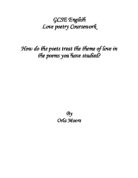We see more of Prufrock’s insecurity in his description of the fog. It “rubs its muzzle on the window panes”, like a wild animal trying to get in, trying to get at him; it “curl[s] once about the house”, surrounding him so that he cannot escape it.
Prufrock is much obsessed by time, repeating: “There will be time”. But the truth of his self-assurances is dubious. As he says, “his hair is growing thin”. The assurance “There will be time” is an excuse so that he need not face the moment of the question. If Prufrock only realises what he already knows: that there will be time until it is gone, and then there will be none, he may escape failure. He never does, however.
As well as expressing his worry about time, the line:
They will say: ‘How his hair is growing thin!’
further expresses Prufrock’s insecurity and his excessive, crippling anxiety of the impression he gives to others. It is this anxiety which prevents him from asking the “overwhelming question”, and leads to his failure.
Prufrock is a man who does not “dare”. If Prufrock could “dare” to speak his mind, or risk asking the question, he would be a much happier man. Even his clothes are self-consciously fashionable, without making a statement: his necktie “rich and modest” (i.e. neither in the extreme), is “asserted by a simple pin”, and his collar is mounted “firmly to the chin”, as if for protection.
More than anything, Prufrock fears that if dares to he “force[s] the moment to its crisis”, he will have been incorrect to do so, and a woman “settling a pillow or throwing off a shawl” will say:
‘That is not it at all,
That is not what I meant at all.’
The important point here is not that Prufrock fears disdain, but that he fears it especially from a woman. Whatever he wants to say or ask but cannot, seems to be linked to his desire for sexual contact. His description of female arms “braceleted and white and bare” is quite sensual – he appears to long for their embrace. The one-line-stanza “I do not think they [the mermaids] will sing to me”, emphasises Prufrock’s loneliness and his desire that they should sing to him, and confirms his failure: they will not.
The line:
And would it have been worth it, after all,
marks Prufrock’s failure. It informs the reader that Prufrock has not overcome his insecurities, and spells his doom. How Prufrock wants to say “I am Lazarus come from the dead, come back to tell you all, I shall tell you all”, how he has prepared for the moment of saying it (“wept and fasted, wept and prayed”), and how tragic his failure. His life will continue to be burnt-out “butt-ends”, the kind of life that can be “measured out with coffee spoons”. When he hears the voices of women, they will have the mournful note of a “dying fall”, for he will never know the speakers as he would like to.
Perhaps the most telling lines of the poem are:
I have seen the moment of my greatness flicker,
And I have seen the Eternal Footman hold my coat, and
snicker,
And in short, I was afraid.
because these lines suggest that Prufrock will never have another opportunity to ask the question or speak his mind. They suggest that he did once have a chance to fulfil his desires, but paralysed by fear, he could not take it. They suggest that all that remains for him now is death. In short, they are an admittance of Prufrock’s own failure.
Thus the assessment “Prufrock is a portrait of human failure” seems apt. Perhaps, however, a better one would be “Prufrock is a portrait of human despair”, or “Prufrock is a portrait of insecurity”, or even “Prufrock is a portrait of one kind of failure”. The latter three assessments, at least, do not depend on your opinion of what constitutes human failure, which is a problem for the first. For example, although Prufrock perceives his own failure to be in his inability to communicate with women, there are hints in the poem that in other areas of his life, Prufrock may have been successful. He is well dressed (“necktie rich and modest”) so presumably fairly well off, and must have been in the upper classes to be attending receptions where women “talk…of Michelangelo”. Other humans may value this superficial success, and disregard that which Prufrock values, and thus the assessment “Prufrock is a portrait of human failure” is perhaps too sweeping.







